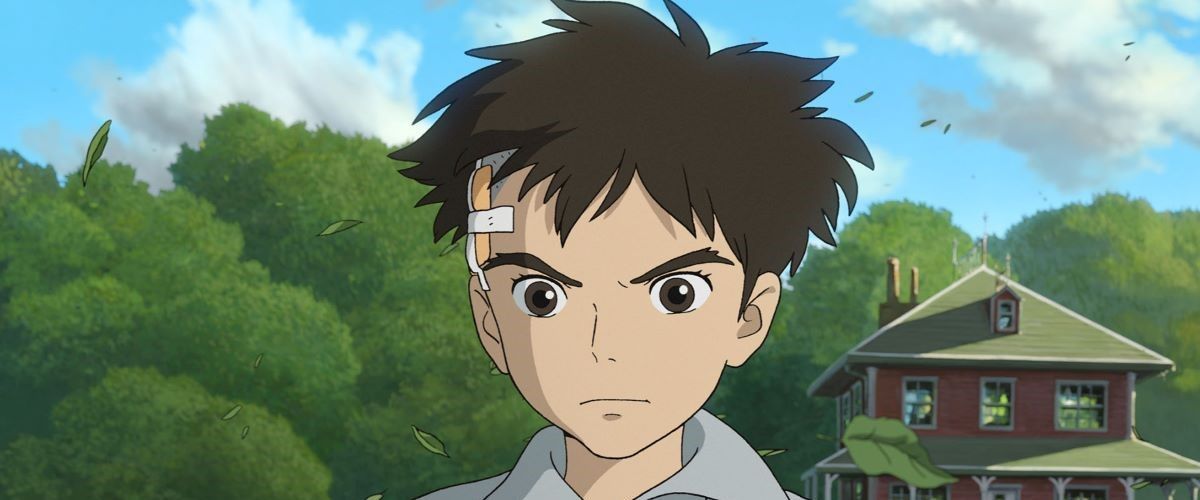Jonah Naplan December 10, 2023
Hayao Miyazaki’s latest and supposedly final film, “The Boy and the Heron,” is a visual treat, so gorgeous that only “Spider-Man: Across the Spider-Verse” compares for the most creatively realized animated film of the year. That’s why it’s so frustrating how the movie seems to be lacking a real semblance of a plot, instead of a series of whimsy events loosely linked together by emotion and deep themes that Miyazaki has been perfecting his entire career. There are also fluent echoes of his personal life, as both a child growing up in World War II and his eventual legacy as an artistic giant (the film’s main character Mahito is reportedly modeled on experiences recounted by a young Miyazaki himself, but probably without the talking heron stuff). The movie’s center is undeniably sincere, and draws on Studio Ghibli’s best and most poignant work (“Spirited Away,” “My Neighbor Totoro”), but it ultimately struggles to grasp onto any reason for being, other than the message at the end, which probably could land just as effectively with a much shorter movie preceding it.
The film chronicles the tale of a 12-year-old boy named Mahito Maki (Soma Santoki), who’s whisked off to the countryside with his father Shoichi (Takuya Kimura) after his mother is killed in a Tokyo hospital fire. Shoichi has remarried with her pregnant sister, a foster parent for Mahito of sorts, named Natsuko (Yoshino Kimura), who seems kind enough, but can’t do much to drown out Mahito’s depression about the sudden change, or his guilt about what he could have done to prevent it. The movie will continue to develop that central idea of grief and refusing to accept a reality that’s uncomfortable or out of your control, by dispatching the protagonist to a fantastical world with indescribable creatures and a wonder that is distinctly Ghibli’s.
The Japanese animation studio has garnered such a positive reputation, having created such ethereal stories with such lovable characters, that we trust them to take us on another memorable journey worth submitting our mind and soul to. “The Boy and the Heron” is a fable that gets so close to achieving that level of greatness you can almost smell it. After all, the formula of the auteur’s best work is in its blood, but the potential to follow a similar path is too rarely acted upon. The pieces are all there. The man who can put them together is on the job. But he seems held back, restrained by some kind of force that was either more lenient or not there at all back in his golden years.
Yet, “The Boy and the Heron” finds new ways that it can innovate, even beyond what Ghibli has already innovated throughout twenty some odd movies. The presence of a crass heron (voice of Masaki Suda) is a refreshing touch, and the alternate universe that Mahito enters is filled with all of its own ravishing details. This dimension is home to armies of ferocious parakeets and colonies of adorable moppets known as warawara, whose purpose is to ascend into the heavens and become human on the other side. Pretty much all of “The Boy and the Heron” matches that same whimsy energy, observing the status quo in a world so vastly different from our own, making it a frequent delight.
But that’s also its biggest issue. “The Boy and the Heron” has stakes, even world-shattering ones, but none of them actually seem to be of any real consequence. It doesn’t help that I wasn’t always sure what was going on, and it wasn’t the type of confusion that can be resolved after repeat viewings either. It’s the kind of perplexity that’s aroused by things maybe not lining up the way that they should, and events occurring out of order, not as a means of gaining new insight into why something happened, but just because linear formality has never been Ghibli’s forte. You can feel that push the most here, probably because it isn’t nearly as well disguised as Miyazaki’s other pieces that aren’t any less personal to the filmmaker than this one.
As Miyazaki has indicated in interviews, his father worked in a fighter plane factory, as Mahito’s father does here, and his earliest childhood memories were of war’s terror. “The Boy and the Heron” is greatly bolstered by that realism, the feeling that the events unfolding were inspired by someone who actually lived them, and didn’t just dream them up in their head, as other iconic facets of Ghibli came about (and there’s certainly nothing wrong with that). But the difference is that “The Boy and the Heron,” being a final act of sorts for Miyazaki, tries too hard and too blatantly to culminate into an amalgamation of all the best parts and strongest themes of the director’s other work, that it ends up preaching.
The message is important; in being offered the opportunity to rule over this mystic realm, Mahito chooses instead to return to the pain of his real home, which speaks to the value of blooming wherever we’ve been planted, and that the adversity we overcome is a defining factor in who we are as people, teaching us vital lessons we can’t learn from anyone or anything else but our own lives and experiences. When this moral circulates, which is, more often than not, the terminating interlude, “The Boy and the Heron” is at its strongest, unpacking themes that have been honed and practiced so much that they’re due for a reinvention. Miyazaki reinvents them, which is a skill he’s always been the most talented at, but what the audience may grasp onto instead is the feeling that there’s actually not a whole lot going on here, besides a whole river of feeling and some stunning visuals. That’s enough for most animated outings, but for Studio Ghibli, it’s the one raisin in a fresh bag of grapes.
Now playing in theaters in Japanese with subtitles, or dubbed in English.

